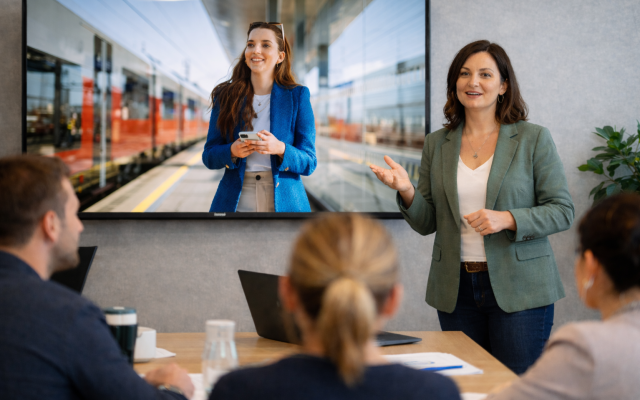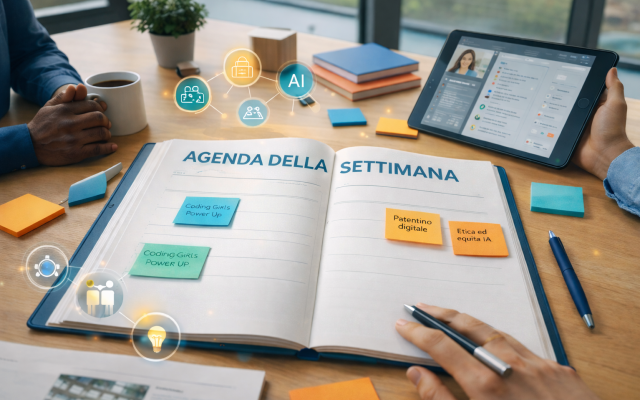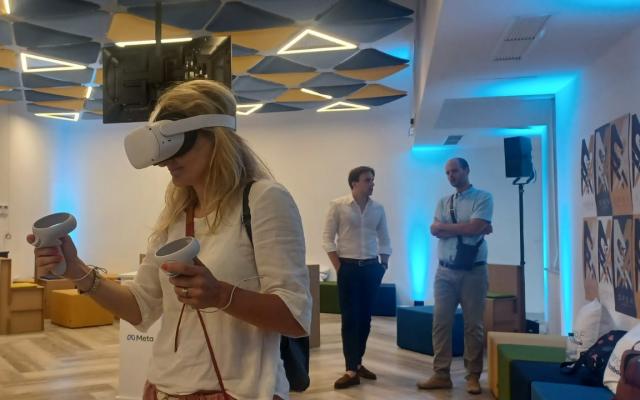New travel and tourism experiences at Binario F with Vagone FMDD
After the Metaverse sessions dedicated to cultural heritage [see news: Metaverse Trials] and education [see news: Immersive Technology for Didactic Activities], yesterday, Binario F held the third meeting of the new Vagone FMD. From 01 to 100 in the Metaverse programme developed with Meta. Policymakers and stakeholders had the opportunity to experience how the metaverse works and verify new applications, especially in the public services area. Short interactive sessions allowed participants to enjoy a complete experience that could be replicated various times to focus on new tools and scenarios.
Here are the ideas that emerged from the third appointment – The Metaverse for Economic Development: Tourism – as summarised by Press Officer Onelia Onorati.
Mirta Michilli, Director General, Fondazione Mondo Digitale. These meetings allow us to address a series of fundamental subjects in the Italian socio-economic system, such as SMEs, the world of education, the public administration and today, in particular, the tourism sector. The objective is to introduce potential users to the most recent technological trends. Thanks to partners like Engineering and institutional interlocutors such as the Council of Orvieto, we can finally identify concrete applications.
Costanza Andreini, Public Policy Manager Italy, Meta. In ten- or fifteen-years’ time, we intend to create a unique metaverse with shared and collectively established rules and protocols. However, it is fundamental to address the possible applicable business models to create a concrete vision for enterprise, schools, and the health sector, driving the development of experiences with technological partners. These hypotheses must be connotated by presence to produce an augmented experience, not a substitute one. You have to be there to become protagonists and provide ideas for the development of the metaverse.
Renzo Iorio, Acting Vice President, Federturismo Confindustria. Notwithstanding the fact that the world I represent seems to be the antithesis of the Metaverse, as it is connotated by extreme tangibility, we want to meet the challenge and participate in the debate. We firmly believe that this technology could stimulate people to travel, just as TV and cinema used to. Enthusiasm and curiosity, but also a true hope that the digital dimensions will help make experiences even more vivid and personal, driving sustainability and local activities, and providing new opportunities for business and local growth. Following today’s experience, I’m already associating the metaverse with travel, for example by train, for entertainment. However, we should move beyond the concept of gaming graphics.
Roberta Tardani, Mayor, Orvieto. In January 2023, we will have an app to make people “virtual citizens of our city” and allow them to visit Orvieto virtually and plan their physical experience. This is the result of a process that began during the lockdown, and which led us to develop a virtual tour of our museums. We have no intention of replacing travel with immersive visits, rather to attract visitor to our city. Digitalisation has allowed us to custom-target promotional campaigns, as we now know who our visitors are and where they come from. The Metaverse also allows access to dangerous sites or sites that are closed for various reasons. The blending of tradition and innovation has allowed us to build on the numbers of 2019.
BRAINSTORMING
Antonio Barreca, Director General, Federturismo. The disorientation that characterizes immersive experiences is replaced by the desire to physically visit these areas. In this case, the Metaverse is an accelerator of curiosity. We still need a hardware improvement for this quest, but in a few years’ time this technology will blossom.
Carlo De Vincentiis, Press Office Director, InfoCamere. In this phase, in which entrepreneurs are still lacking in basic digital literacy, immersive technology could help bridge the gap and connect the real dimension to the public agency. I hope that everyone will help drive the development of this technology.
Adriano Fruscini, Civita Mostre e Musei. I work on digitalisation at Civita. At present, we are striving to communicate to various generations via adequate channels. The hybridization of traditional channels (billboards) and digital information is currently the winner. We have two projects in mind: first a portal and then the Metaverse. We would like to produce a physical exhibition (an irreplaceable value for us) together with a virtual one.
Mario Liguori, President, EgaWorldWide. I believe that my events company is close the Metaverse, especially in medical-scientific and public administration areas.
Francesca Montanari, Tourism Department, Education, City of Rome. The Metaverse can add to the educational programmes of public administrations, such as the one I am responsible for, especially for the students who do not have the opportunity to experiment with many real situations physically. It could provide both a stimulus and new skills for personal growth. We hope that this technology will allow for universal access.
Davide Pantile, Commercial and Project Manager, ETT Solutions. The experience in Orvieto adds a further dimension to the physical experience, it does not replace it.
Domenico Racanelli, Business Development & Key Account Manager, InfoCamere. Sooner or later this technology will become reality. We have worked on digital services, but this has decreased our contact with others, decreasing our feedback. The Metaverse will remedy this situation.
Maristella Vicini, CEO, ISEA. We are trying to understand where the world is headed. However, it’s complicated to identify users and propose the Metaverse as a training element, as it requires very sophisticated tools. We need to drive individual education.
Furio Gramatica, Director Development and Innovation, Fondazione Don Gnocchi. I’m very interested in this issue. In our world, technology helps us move ahead. It provides empowerment to both health operators (who will have a better vision of treatments) and their patients (who will receive information and communications more easily), as well as for all those with special needs but who are almost independent. For example, it is fundamental for patients in occupational therapy to see Orvieto ahead of time and plan their trip with a good idea of the issues and potential. It is important for cultural training as addressed by FMD. We also need expert mediators to help people use this technology.




